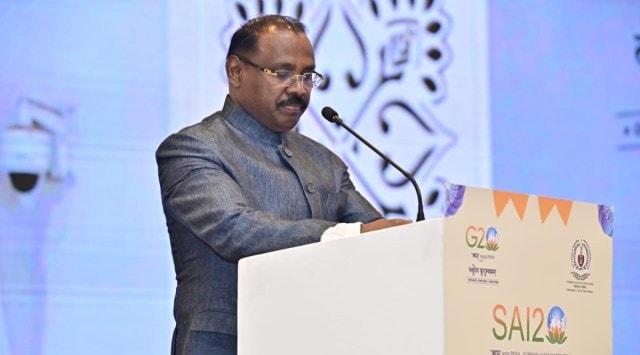Observing that artificial intelligence (AI) is making “greater inroads” into governance, Comptroller and Auditor General (CAG) of India Girish Chandra Murmu said on Monday that Supreme Audit Institutions (SAI) must inevitably prepare themselves for auditing AI-based governance systems and look for opportunities to adopt AI into their audit techniques to increase their effectiveness.
Addressing the second SAI20 Summit of the SAI20 Engagement Group under the Indian Presidency of G20, Murmu said, “The reality of Artificial Intelligence has come a long way since the term was first coined in 1956 by John McCarthy at a workshop held in Dartmouth. Today, it is an integral part of our lives, whether we realise it or not. There is a curiosity and belief that AI can help countries achieve development goals, impacting economic growth while simultaneously disrupting labour markets.”

“At an individual layman level, Chat GPT compelled us to recognise it and also triggered the debate of its utility vis-à-vis its risks, especially if recklessly used by young students. This combined with a spate of statements by the very developers in the field, concernedly commenting on its considerable carbon footprints, risks, ethicality and challenges, underscores the need for Responsible AI,” Murmu said at the summit, which was inaugurated by Goa Governor P S Sreedharan Pillai.
Amitabh Kant, India’s Sherpa at G20, also addressed the SAI20 Summit, which will discuss two themes — Blue Economy and Responsible AI — over two days.
Highlighting the need for responsible AI, Murmu said, “Considering the power, possibility and perils of AI, it is essential that policy makers put in place processes to responsibly harness the potential of this technology.”
“Responsible AI stands on four pillars — organisational democratisation that empowers and encourages individuals to raise concerns; systems that enable AI to flourish; systems and platforms that are trustworthy and explainable by design, and articulation of responsible AI Mission that is anchored in organisational values and ethical guardrails,” the CAG said. “With AI making greater inroads into governance, SAIs must inevitably prepare themselves for auditing AI-based governance systems. Simultaneously, SAIs must look for opportunities to adopt AI into their audit techniques to increase their effectiveness.”
“As availability of updated data is the bedrock on which any responsible Al system can unlock its full potential, the primary concern for the auditor is to ensure data accuracy, reliability and integrity, backed by an independent and robust system that periodically collects and collates data. Moving beyond these fundamentals, I am of the view that the auditor must seek to provide the assurance that Al-based decisions do not result in exclusions, biases or violations of privacy,” he said.
Story continues below this ad
Talking about Blue Economy (marine resources), Murmu said, “As Blue Economy gains primacy, so will its audit. To keep ahead of the curve, the SAI20 community must prioritise collaborations in arriving at new techniques, skills, capabilities and methods.” I would urge that we proactively formalise channels and platforms that would facilitate this, he said.
Murmu also announced the establishment of a Center for Excellence in the Blue Economy at SAI India’s International Centre for Environment Audit and Sustainable Development, Jaipur.
Speaking on the occasion, Amitabh Kant said India’s G20 Presidency is based on the theme of ‘One Earth, One Family and One Future’.
“Our Prime Minister’s vision is that we may have different ideologies. We may have different political perspectives. We may have different boundaries but we all are part of the same cosmic wave and therefore we derive our theme from the ancient Indian civilisation saying that the earth is one family—vasudhaiva kutumbakam,” Kant said.
Story continues below this ad
On the role of the supreme audit institutions, Kant said, “It is vital in ensuring that public resources are used both effectively and efficiently, and the public trust is upheld. As professional auditors, they play a vital role more than ever before by addressing the complex and challenging economic and social development issues facing our country.”
“What you recommend is very critical. What you recommend as the supreme audit institution will be critical in drafting the leaders memorandum of the G20. I can assure you that we recognise the unique role that supreme audit institutions play in collaborating with us, both inside and outside the G20,” he said.
Kant suggested that the SAI20 can be a separate accountability institutional track in addition to the existing finance and sherpa tracks.
Goa Governor Sreedharan Pillai said the SAI20 Group under the aegis of G20 is expected to play a central role in strengthening governance and delivering a positive impact on the lives of citizens. The SAIs in their respective countries are a key pillar of accountability, effectiveness and ensuring integrity in governance, he said.
Story continues below this ad
About 85 national and international delegates from 17 countries, including G20 member SAIs, guest SAIs, invited SAIs, along with international organisations and Think20 and Youth20 Engagement Groups attended the summit.









